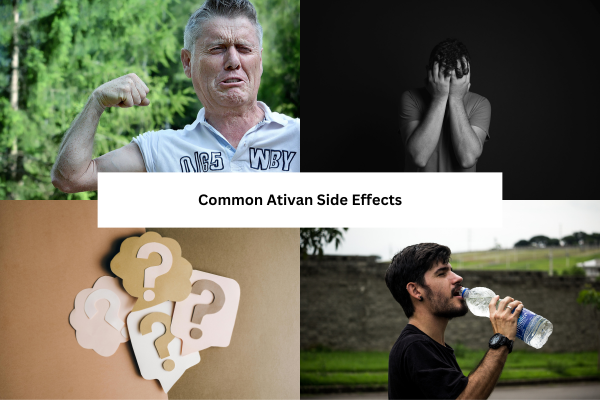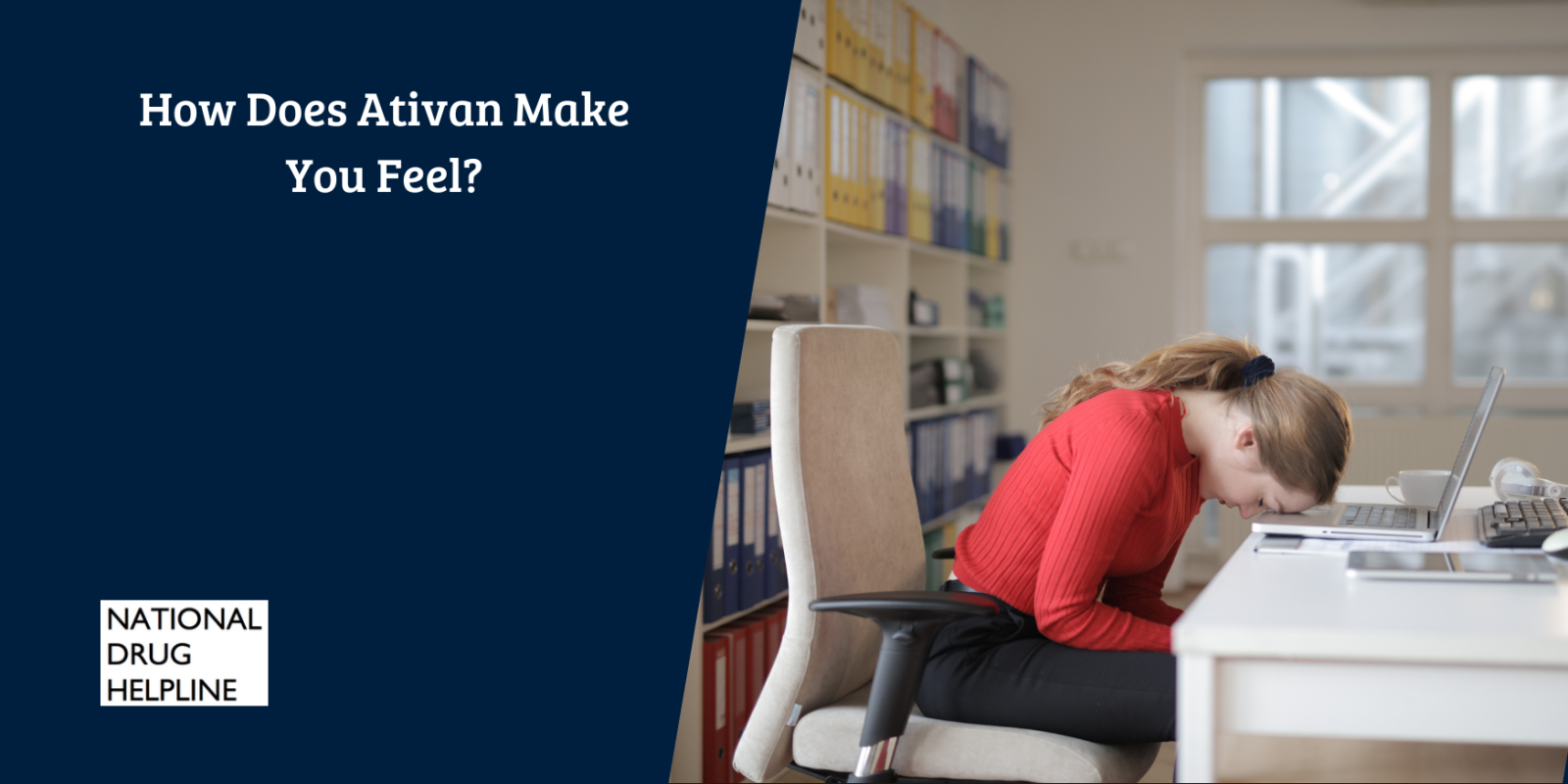Ativan is the brand name for lorazepam, which is a medication commonly prescribed to manage anxiety, insomnia, and certain seizure disorders. Like any other benzodiazepine, it works by enhancing the calming effects of gamma-aminobutyric acid (GABA). [1] GABA is an inhibitory neurotransmitter in the brain. But how does it feel when taking Ativan?
In this article, we’ll explore how Ativan makes you feel, what to expect from its effects, how long Ativan lasts, and the potential side effects and risks of addiction.
How Does Ativan Make You Feel?
After taking Ativan, most people report feeling calm, relaxed, and less anxious. The medication starts working within 15 to 60 minutes of ingestion. This creates a sense of emotional and physical relief.
Here’s what someone might typically experience:
- Reduction in anxiety and racing thoughts
- A calming sensation in the body and mind
- Slower breathing and heart rate
- Mild sedation or drowsiness
- A sense of detachment or emotional dulling
If people with acute anxiety or panic attacks take Ativan, they can feel a wave of peace washing over them. For others, it may feel like a slight intoxication or a mild high. This is especially true when the medication is taken at higher doses.
Does Ativan Make You Sleepy?
Yes, Ativan can make you feel sleepy. The drowsy effect is especially prominent at moderate to high doses. The most common side effect is drowsiness, which is one of the reasons it is also used in the management of short-term insomnia. While Ativan may induce a restful sleep, it may result in a groggy or foggy feeling when waking up.
Therefore, Ativan is advised to be taken in situations when alertness is not required, such as before bed or prior to a medical procedure like surgery.
How Long Does Ativan Last?
Ativan is an intermediate-acting benzodiazepine. Here’s a quick overview of its timeline [2]:
- Onset of Action: 15 to 60 minutes
- Peak Effects: 1 to 2 hours
- Duration of Effects: 6 to 8 hours
- Half-Life: Around 12 hours (though this can vary)
While the primary effect of Ativan wears off within 6 to 8 hours, most people may feel residual drowsiness or cognitive dulling the next day. This effect can be worse when Ativan is taken late at night or in high doses.
Common Ativan Side Effects
Like all other medications, Ativan also has the potential to cause side effects. While some effects are mild and short-lived, others may be more serious. This is especially true with long-term use or misuse. Some common side effects include [3]:
- Drowsiness or fatigue
- Dizziness or lightheadedness
- Slurred speech
- Muscle weakness
- Confusion or memory problems
- Poor coordination
- Dry mouth
- Blurred vision
These effects are most pronounced when you first start taking the medication or increase your dose.

Serious Side Effects:
- Trouble breathing
- Severe confusion or hallucinations
- Unusual mood changes, such as agitation or aggression
- Suicidal thoughts
- Seizures
If you notice any of these symptoms, it is important that you contact a healthcare provider as soon as possible.
Ativan and Addiction: What You Should Know
Ativan has a high potential to cause dependence and addiction. This risk is particularly high when it is taken for extended periods of time or in doses higher than recommended. But there is still a risk of building up tolerance even when the medication is taken as directed. This means they need more of the drug in order to achieve the same calming effects. However, this can quickly escalate into physical and psychological dependence.
Signs of Ativan Dependence or Abuse:
- Taking more than prescribed
- Feeling unable to function without it
- Experiencing withdrawal symptoms e.g., insomnia, anxiety, tremors when not taking it
- Craving the medication
- Doctor shopping to get multiple prescriptions
Going through withdrawal from Ativan can be difficult and even dangerous. Some withdrawal symptoms that may occur are heightened anxiety, irritability, insomnia, and muscle pain. In severe cases, seizures or psychosis may also occur. Therefore, it is important to taper off the drug only under medical supervision.
Who Should Be Cautious When Taking Ativan?
In some people, it is best to take caution while taking Ativan or to avoid taking it entirely. People who should be cautious when taking ativan are:
- People with a history of substance use disorder
- Older adults, who are more prone to falls and cognitive impairment
- Individuals with respiratory issues like COPD or sleep apnea
- Those with liver disease
- Pregnant or breastfeeding women (Ativan may cause harm to the baby)
Ativan should not be taken as a long-term treatment for anxiety due to the risks of tolerance and dependence. Ativan is often prescribed by healthcare providers as a short-term solution until other treatments such as SSRIs or therapy are initiated.
What Taking Ativan Feels Like Over Time
Ativan may feel like a miracle drug for anxiety as it offers fast relief from intense emotional distress. But over time, this feeling may eventually dull. Eventually, users find themselves requiring high doses in order to achieve the same result.
Some people report that they feel emotionally numb or disconnected after taking Ativan for a prolonged period. However, others find that it can interfere with memory or decision-making. Therefore, long-term Ativan use is generally discouraged unless it is absolutely necessary and is being monitored by a physician.
Final Thoughts: How Does Ativan Make You Feel?
Ativan can make you feel calm, relaxed, and often sleepy. Thus, it is ideal for managing short-term anxiety or insomnia. But, it also carries its own set of side effects along with the risk of side effects, dependence, and addiction. This is particularly true when it is used long-term or in doses higher than recommended.
If you are considering Ativan or are currently taking it, it is essential that you have an open dialogue with your healthcare provider. There may be safer, more sustainable treatment options available. If you or someone you know is suffering from Ativan misuse, feel free to reach out to Drughelpline.org by calling their helpline for immediate support.
References
| ↑1 | Rundio, Al. “Ativan (Lorazepam).” Journal of Addictions Nursing 23.2 (2012): 141-142. |
|---|---|
| ↑2 | Greenblatt, David J., et al. “Clinical pharmacokinetics of lorazepam.” Clinical Pharmacology & Therapeutics 20.3 (1976): 329-341. |
| ↑3 | Santos, Enrique. “Lorazepam (Ativan): Harm Reduction, Dosage, Effects.” |

